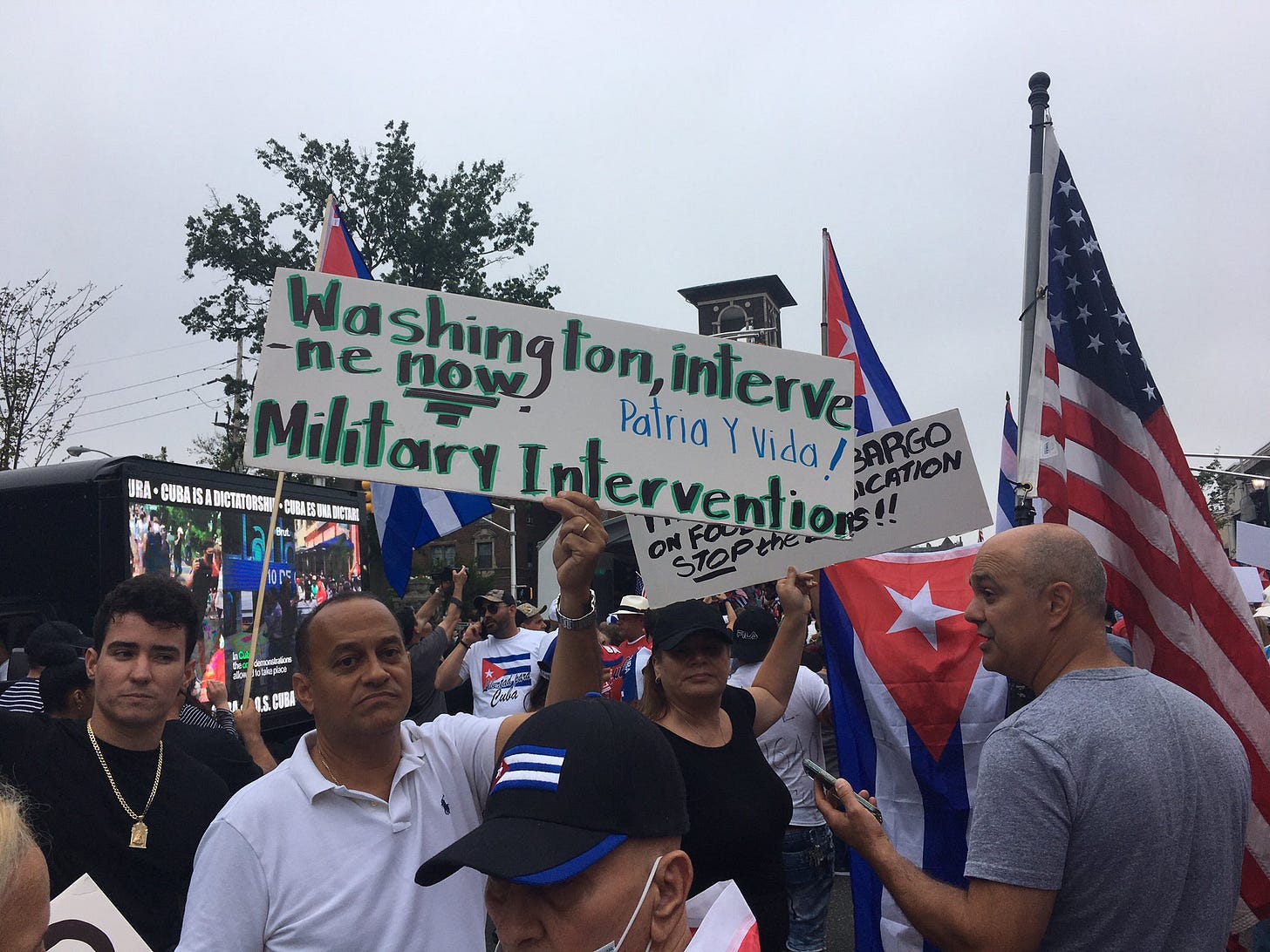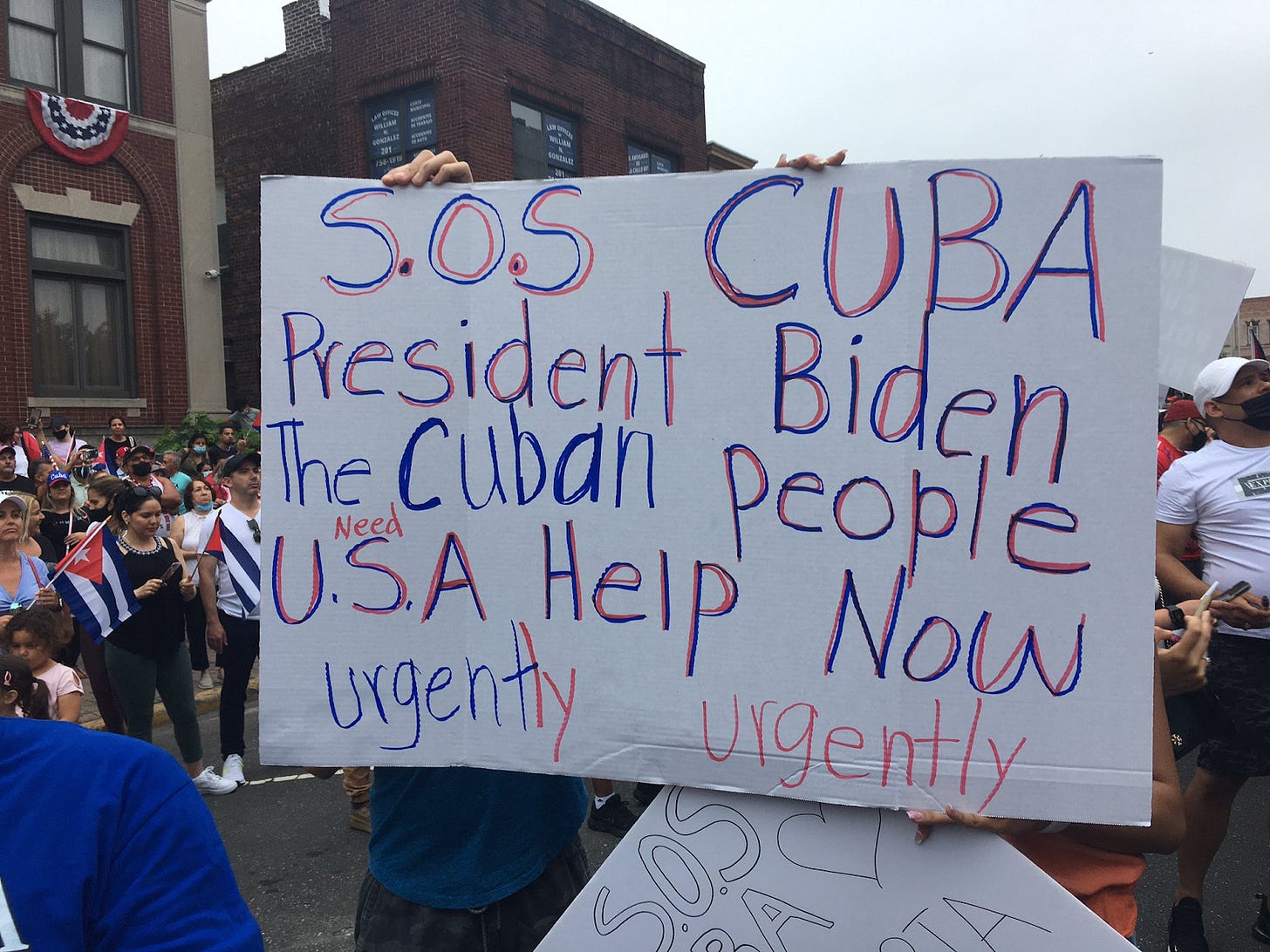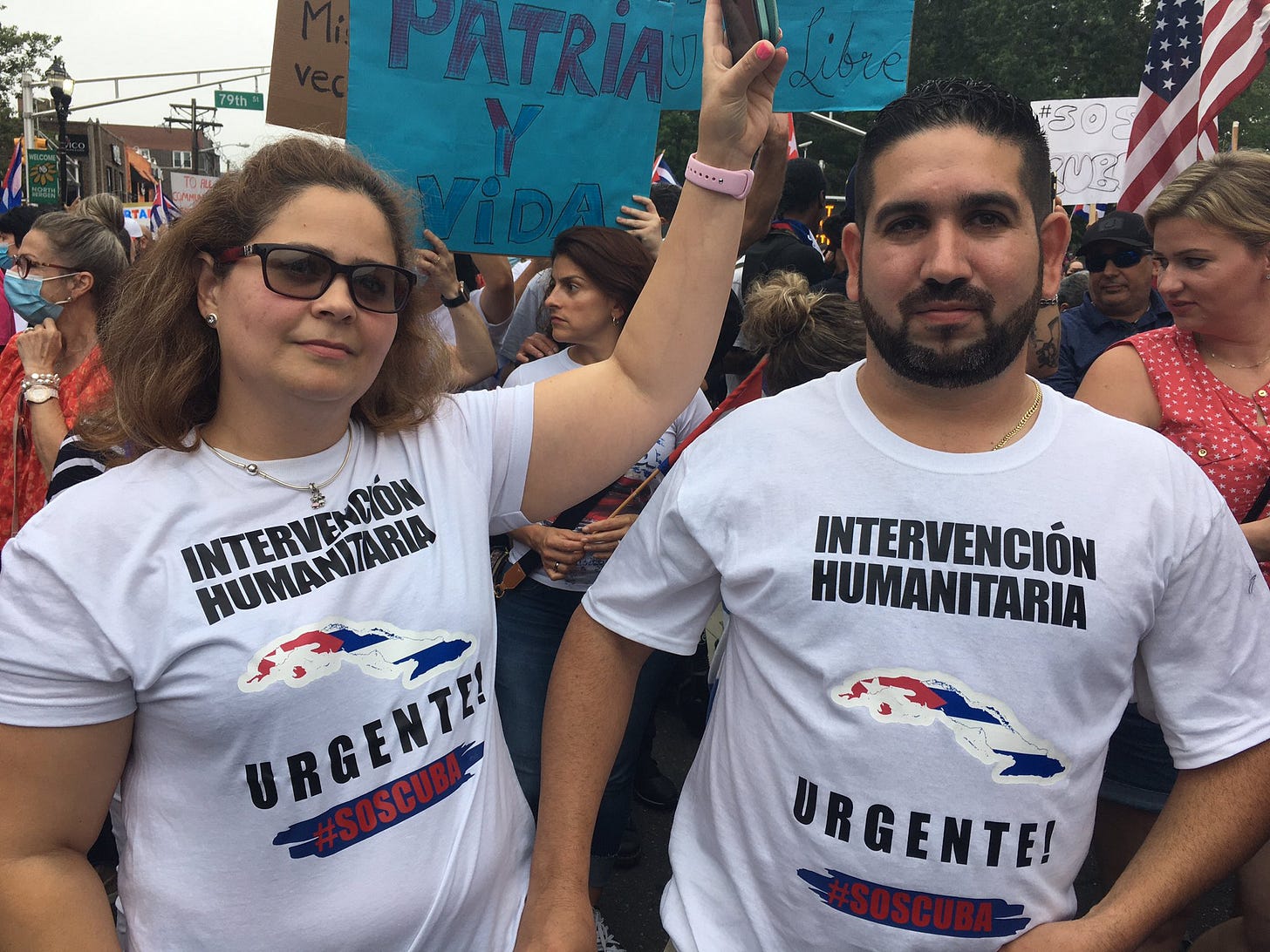Democrats And Republicans Unite To Demand US Invasion Of Cuba
There are some parts of the US where municipal elected officials who ordinarily concern themselves with things like trash removal, parking regulations, and petty graft are occasionally expected to take passionate stances on foreign policy issues. Israel would be that issue in certain heavily Jewish enclaves around the New York City area, although recently those political dynamics have shifted somewhat. In select Hudson County, NJ towns like North Bergen, West New York, Guttenberg, and Union City — that foreign policy issue is Cuba.
Example: Although he conceded he was “not an expert” and therefore not in a position to recommend any specific US policy action in response to protests currently underway in the island nation, North Bergen “Public Safety” commissioner Allen Pascual told me this week he longed for the days when the “Rat Pack” could run wild in Cuba. So that’s the kind of Wikipedia-level cultural nostalgia driving at least some portion of Cuba-related opinion among these low-level municipal officials. Frank Sinatra and Sammy Davis Jr. serenading succulent young ladies amidst plumes of cigar smoke and organized crime oligopolies, or something.
Pascual had been participating in an emergency “Cuban Liberation” rally and march that kicked off in his stomping grounds of North Bergen, then proceeded south down through Guttenberg, and culminated at City Hall in West New York. I would estimate there were somewhere between two and four thousand people there — but don’t hold me to that, because attempting to guess crowd sizes always leads to trouble. In any event, the participants were substantially more rabid than I would expect to see at any “pro-Israel” rally under present circumstances. And I say “rabid” not necessarily as a pejorative — just to capture how uninhibited and enthusiastically expressive these Cuban-American rally-goers were. It’s likely a function of Cuban-Americans operating within their own relatively-more-insular political/demographic subgroup than “pro-Israel” factions.
Sometimes referred to as “Havana on the Hudson,” this area is populated by the largest enclave of Cuban-Americans outside Florida. Hudson County is also a place where you can simultaneously serve as a NJ State Senator and Mayor, which is absolutely brilliant for accumulating and entrenching political cache, as well as accumulating and entrenching one’s public pension. Brian Stack has been mayor of Union City for nearly 21 years, and a simultaneous NJ State Senator for 13. (Four years of faithful NJ Assembly service before that.)

As one of the few English-speakers addressing the rally, Stack really let loose and explicitly called for a US military invasion of Cuba. “The same as we’ve liberated other countries,” he subsequently told me. “We should’ve been in Cuba many many years ago… just like we went in and liberated Kuwait.” He continued, “Cuba, no doubt about it — this should be a democracy. And we have a great opportunity now with something that’s 90 miles off the Florida Keys, to make it a democracy.”
Asked (by me) whether recent US military inventions should inspire confidence in the success of this plan he was proposing, Stack said: “Listen, I'm not here to judge the invasions around the world.”
Fortunately for those who regard a potential US invasion of Cuba as insane, Brian Stack doesn’t have direct influence over the conduct of US foreign policy. He’s an elected official in one of the few parts of the country where there is genuinely a mass constituency for US military action against Cuba, and from the standpoint of political self-interest his rabble-rousing activities are perfectly explicable. But he does have influence over Democratic Party machine politics in New Jersey. As a resident of the area, I can attest that there are currently campaign billboards all over the place emblazoned with his photo smiling alongside Gov. Phil Murphy, with both having just prevailed in uncontested Democratic state primaries. (Although, side note: Stack is one of the many New Jersey Democratic power brokers who endorsed Chris Christie.)
And he was not a mere participant at this “Cuban Liberation” extravaganza; Stack personally organized the rally on 24 hours’ notice along with fellow Democratic mayors Nicholas Sacco, Wayne Zitt, and Gabriel Rodriguez. So this was effectively a state-run and state-endorsed event, which is a curious contrast with other forms of less “official” public protest. (Avowed state-backing was also a feature of many “BLM” rallies that took place last summer.)
Sacco is another quintessentially NJ political creature. Amazingly, he’s been mayor of North Bergen since 1991 and a State Senator since 1994, thus drawing two public salaries (“double-dipping”) for a whopping 27 years. This dual office-holding practice was legislatively banned in 2008, but Sacco was “grandfathered” in, as was Stack. That frees them both up to engage in a little military intervention advocacy on the side. “If it takes the force and strength of the United States, it should be used to free those people,” the famed double-dipper Sacco declared Tuesday.
While anything could happen, it’s doubtful that Joe Biden will accede to these demands for military intervention. But in some ways, the pro-intervention advocacy on display in New Jersey could be even more influential on a Democratic administration than the pro-intervention advocacy also rabidly underway in South Florida, where Cubans are more reliably Republican. (GOP mayor of Miami Francis Suarez just called for US airstrikes.) Hudson County, NJ on the other hand is a major Democratic stronghold, and so calls for military action emanating out of it could scramble some of the expected partisan configurations surrounding the issue.
But perhaps most importantly, Union City is the political base of Sen. Bob Menendez (D-NJ), a former Senate colleague of Biden and the Chairman of the Senate Foreign Relations Committee. He preceded Stack as mayor of Union City. While Menendez generally takes a predictably hard line on Cuba policy, just as he does on most other foreign policy issues including Israel and Iran, as yet he’s refrained from following in the footsteps of his mayoral successor Stack to endorse outright military intervention. (Although he did just proclaim this week on MSNBC, “We Have To Challenge The Regime,” whatever that means exactly.) Here is what Juan Pachon, a spokesperson for Menendez, told me:
To answer your question, Chairman Menendez was absolutely clear at a press gaggle earlier this week in saying there will NOT be military invasion or intervention in Cuba. I’ll let you quote from him but he went through the history of how even the most anti-regime and anti-communist presidents going back to Reagan had never entertained that as a real possibility. To my boss, that is exactly the type of rhetoric and theories that the regime wants to push
So, that’s the best indicator one’s likely to get that no military intervention is in the cards. In the Biden-to-Trump transition, Menendez has supplanted Marco Rubio (R-FL) as the most influential Senator on the matter vis-a-vis Executive Branch policy. Rubio, no doubt smarting from his demotion as Trump Administration pointman for fomenting regime change across Latin America — with his fevered antics having backfired spectacularly in Venezuela — now has limited sway. He’ll have to content himself with whipping up Twitter frenzies, and sporting a brand new repurposed Communist “raised fist” logo as his profile pic.
It should not be under-stated how fervently these Cuban-American populations want concrete US military action. With the exception of one sole person, every rally attendee I spoke to was explicit that the “help” they were seeking from the US was a military intervention. I deliberately did not “cherry-pick” these answers — it was the clear sentiment of Cubans-Americans engaging in public activism right now.
No matter how alienated the US populace is purported to be with US interventionism after so many failed misadventures of late, the logic of interventionism always seems to resurface. Which makes sense, given that the US is one of the few countries with the capacity to overthrow foreign governments at will. As former Secretary of State Madeleine Albright is reported to have once said: “What’s the point of having this superb military you're always talking about if we can't use it?”
It’s extremely easy to posture as an “anti-interventionist” in the abstract — few would overtly brand as a committed “interventionist” these days — and then throw your skepticism out the window when it comes to specific circumstances in which you think it’d be a great idea to deploy US power to topple a foreign government.
After attending the rally, I asked my Twitter followers if there was anyone who could provide something resembling a “balanced” take on what’s currently happening in Cuba. While I have zero doubt that there are plenty of Cubans disillusioned with the government and their general living conditions — state officials report the economy contracted 11% in 2020 — the information being fed into the US media ecosystem right now is largely filtered by émigré populations who have deep ideological, personal, and financial investment in overthrowing the government. Their hostility to the Cuban government is understandable, but also cause for some measure of journalistic skepticism as it relates to the information flooding social media and elsewhere.
Nick Ramos supplied exactly what I was asking for with this Medium article, which I highly recommend reading. We also had a livestream discussion on Rokfin, the full version which you can watch here. An excerpt is available on YouTube here.
One thing I brought up to Ramos was an impression I got attending the rally/march this week, which ironically relates to a slightly counter-intuitive notion of “American Exceptionalism.” The protests struck me as highlighting something “exceptional” about America, in the sense that decades-long preferential treatment can be given to a particular ethnic/nationality group, and then that same group has no compunction about agitating for the US government to invade their previous country. The vast majority of Cuban immigration to the US since the Cuban Revolution of 1959 has been enabled by special provisions of US federal law. As a 2016 Congressional Research Service report noted, “US immigration policy toward Cuba is the product of a unique set of circumstances and is unlike US immigration policy toward any other nation in the world.” The Cuban Adjustment Act fast-tracks Cubans present in the US to citizenship, and they are eligible to receive federal resettlement assistance. “Unlike most other applicants for adjustment to [Lawful Permanent Resident] status, Cuban nationals do not have to be sponsored by an eligible family member or employer,” the report says.
It also seems “exceptional” that Cuban-Americans who’ve been granted these special privileges can freely agitate for invasion in their native language, as was the case at the NJ rally/march, which was conducted almost exclusively in Spanish aside from a handful of gringo politicians like Brian Stack. According to another report from the Migration Policy Institute, “Cuban immigrants are much less likely to be proficient in English and speak English at home than the overall foreign-born population. In FY 2018, about 61 percent of Cubans ages 5 and over reported limited English proficiency, compared to 47 percent of the total foreign-born population.” Ordinarily you’d think US conservatives would be especially exercised about a thing like this, but they don’t seem too worried at the moment.
Should no invasion materialize, the protesters can at least take solace in the policy continuity between the Trump and Biden Administrations. In June, the US under Biden continued its normal posture of opposing a UN resolution calling on the US to rescind the trade embargo against Cuba, 184 to 2, with Israel being the only country that joined the US in voting against. The émigrés can also take solace in knowing that protests often occur throughout the world — including in the Caribbean — but receive comparatively negligible US media attention when longstanding US geopolitical imperatives are not implicated.
Recognizing the distortions of these dynamics doesn’t require denying that people in Cuba have legitimate grievances. Affirmatively defending the clearly decrepit Cuban system of government, with its deprivation of individual liberty, would be ridiculous. Free expression is severely stifled in Cuba, among many other iniquities that make it a vastly less desirable place to live than the US. But what Americans have direct influence over is the policies of their own government, and the US government has been embargoing Cuba for more than six decades. Certain groups are now enjoining it to launch another invasion. So that’s all the more reason to at least look askance at specially generated hashtags like #SOSCuba, because there’s a reason these messages are being transmitted in the manner they are to US audiences: to solicit US policy action.
One of the few English speakers at the NJ march/rally exhorted the crowd to “keep posting.” OK fine, keep posting. I think a more prudent motto would be: “post, but verify.”





What the hell is wrong with you Mike? You are not supposed to be a journalist and explain to us that the situation is complicated with many agendas and few good options. You are supposed to be a "journalist!" Tell us a simplified good vs. evil narrative with questionable facts, even more questionable policy decisions, simplified outcomes, and a way to blame everyone we don't like for it.
I am more right leaning and regardless of who’s in office, Trump or Biden, I oppose any military intervention in Cuba (or anywhere else). Their people need to solve their own problem.